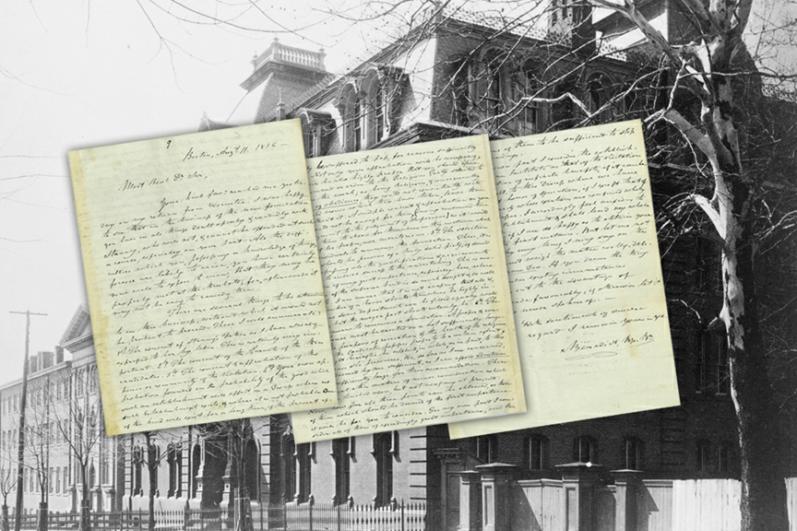Bishop Fenwick asks for the presence of the Visitation Nuns in the diocese
On August 11, 1836, exactly two years after an anti-Catholic mob burned the convent and school of the Ursuline Nuns in Charlestown, Bishop Benedict Fenwick of Boston wrote to Bishop Samuel Eccleston of Baltimore regarding the possibility of the Visitation Nuns establishing a new school in the Diocese of Boston.
Briefly, the Visitation Nuns were founded on June 6, 1610, at Annecy, France, by St. Francis de Sales and St. Jane Frances de Chantal. Originally a congregation devoted to visiting the sick in their homes, a "second founding" saw it evolve into a religious order requiring solemn vows and cloistering. Within the first few decades of existence, they began teaching students, originally to combat heresy, from which point forward education continued to be part of their mission.
They arrived in the United States in 1799 at the invitation of Bishop Leonard Neale, SJ, of Baltimore, and established a school in Georgetown, Maryland. The Ladies' Academy of the Visitation of the Blessed Virgin Mary was like that of the Ursulines, charging tuition, room, board, and other fees as a means of supporting the order and was open to Protestant as well as Catholic students.
Following the incident in Charlestown, the Ursulines were deprived of their means of support, and Bishop Fenwick arranged for their return to Quebec in May 1835. Despite this, he retained the belief that a school such as the former one in Charlestown or that of Georgetown would provide the diocese with "infinite benefits." Rather than asking the Ursulines to return, he preferred the Visitation Nuns establish themselves in Boston and commence a school, reasoning they would have a clean reputation, being unassociated to recent and traumatic events, and therefore a greater chance of success.
In his letter to Bishop Eccleston, it appears there was some doubt as to the feasibility of establishing the Visitation Nuns in the Diocese of Boston, despite Bishop Fenwick offering to "lend my whole aid toward it, if I am so happy as to obtain your sanction in the first instance." He outlines the six major conditions which need to be met for the proposition to succeed:
The first four related to gaining the permission of stakeholders, including the parents of three candidates for the school, the Visitation Nuns, and Bishop Eccleston. Regarding the last item, Bishop Fenwick advises that it should be contingent upon Bishop Eccleston determining that founding an institution of the Visitation Nuns, and the risk of doing so where there are none currently, would not outweigh the potential benefit to the diocese. Also, to take into consideration that should they choose not to pursue this presently, it is unlikely to happen for some time. Bishop Fenwick urges Bishop Eccleston to be sure of his convictions, believing that the Nuns would not agree without his full support and belief in the idea.
Bishop Fenwick's fifth point relates to the selection of the Nuns assigned to commence the school in Boston. Writing they "should be persons of a truly solid piety, of sound mind, and possessing all the qualifications and acquirements necessary to ensure success to the undertaking." He emphasizes that this is particularly important in Boston, "where education of the superior kind is so much sought and so well attended to." While not all of them need to have received an advanced education, he states, the majority should.
The sixth and final point relates to the necessity of a house for the Nuns which would, most likely, also serve as the school building. Bishop Fenwick emphasizes the importance of a sufficiently large lot for the recreation and health of the residents and mentions one of the candidates possesses property that may be used, in part or whole, for this purpose.
Bishop Fenwick continues, writing "there are several matters of minor consideration which might we touched upon, but not necessary at present." Which of the six points are most important, and which can be met, he will leave to the Bishop Eccleston to make his own judgment while adding that "for my own part I consider all of them of exceedingly great importance, and the want of any one of them to be sufficient to stop all farther proceedings."
Finally, Bishop Fenwick closes the letter, "if you deem the thing practicable under existing circumstances and will turn out to the advantage of religion -- decide favorably; if otherwise let it be as a thing never spoken of.
Though the cause is not immediately evident, the Visitation Nuns did not establish a school in the Diocese of Boston during Bishop Fenwick's tenure. Despite earlier doubts, he pursued reestablishing the Ursuline Nuns, who returned to Boston in 1838. Though his fears of renewed anti-Catholic sentiment were not overtly realized, perhaps indirectly it was responsible for the lack of enrollment in their school, forcing them within a few years to leave Boston once more.
- Thomas Lester is the archivist of the Archdiocese of Boston.



















